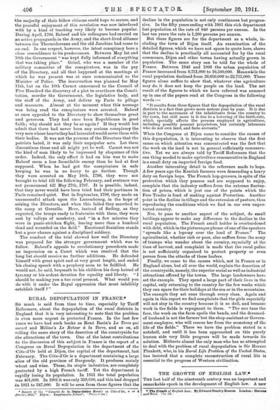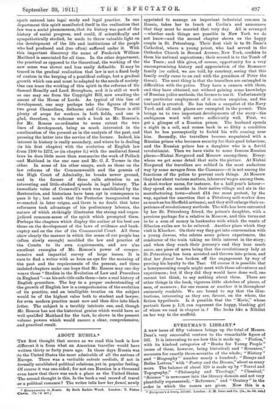THE GROWTH OF ENGLISH LAW.*
THE last half of the nineteenth century was an important and remarkable epoch in the development-of English law. A new • no Grown: of English law. ByEdward Stanley Roscoe. London: Stevens and Sons. iTs. 6d. . spirit entered into legal study and legal practice. In one -department this spirit manifested itself in the realization that Jaw was a social phenomenon, that its history was part of the -history of social progress, and could, if scientifically and sympathetically studied, be made to throw valuable light on .the development of the life and institutions of the people who had produced and (too often) suffered under it. With this important discovery the name of Frederick William Maitland is associated for all time. In the other department, the practical as opposed to the theoretical, the working of the new sense was slower and less easily definable. It may be -traced in the gradual realization that law is not a fixed body of custom in the keeping of a pontifical college, but a gradual growth which can and must be adapted to the needs of society. One can trace the working of this spirit in the reforms of Sir -Samuel Romilly and. Lord Brougham, and it is still at work -as one may see from the Copyright Bill, now awaiting the assent of the House of Lords. As typical of this line of development, one may perhaps take the figures of those two great Chancellors, Selborne and Cairns. There is still plenty of scope for workers in both fields, and one is glad, therefore, to welcome such a book as Mr. Roscoe's, _for Mr. Roscoe co-ordinates to some extent the two lines of development, being as much interested in the amelioration of the present as in the analysis of the past, and pressing the latter into the service of the former. Indeed, his interest in history is really secondary, and where he is dealing (in his first chapter) with the evolution of English law irom 1100 to 1272, or (in chapter ii.) with the medieval forest -laws he does little more than summarize the work of Pollock and Maitland in the one case and Mr. G. J. Turner in the .other. In some of his other essays, such as those on the :law reforms of the Commonwealth and the genesis of 'the High Court of Admiralty, he breaks newer ground, and in the former of these calls attention to an interesting and little-studied 'episode in legal history. The immediate value of Cromwell's work was annihilated by the Restoration, and historians have been apt in consequence to -pass it by ; but much that the Protector inaugurated was re-enacted in later reigns, and there is no doubt that later reformers took advantage of his preliminary labours, the 'nature of which strikingly illustrates the strong and unpre- judiced common-sense of the spirit which prompted them. eerhaps the chapters which display the author at his best are those on the development of the laws of evidence and bank- ruptcy and on the rise of the Commercial Court. All these :show clearly the manner in which the sense of our people has (often slowly enough) moulded the law and practice of 'the Courts to its own requirements, and are also excellent examples of Mr. Roscoe's power of compre- hensive and impartial survey of large issues. It is rare to find a writer with so keen an eye for the meaning of the past and the requirements of the present, and these isolated chapters make one hope that Mr. Roscoe may one day weave these " Studies in the Evolution of Law and Procedure an England "—as his sub-title calls them—into a real history of English procedure. The key to a proper understanding of 'the growth of English law is a comprehension of the evolution of its practice, and an intelligible treatise on the subject would be of the highest value both to student and lawyer, for even modern practice must now and then dive into black letter. The subject is a terribly intricate one, and, though Mr. Roscoe has not the historical genius which would have so 'well qualified Maitland for the task, he shows in the present volume powers which would ensure a clear, comprehensive, .and practical result.











































 Previous page
Previous page